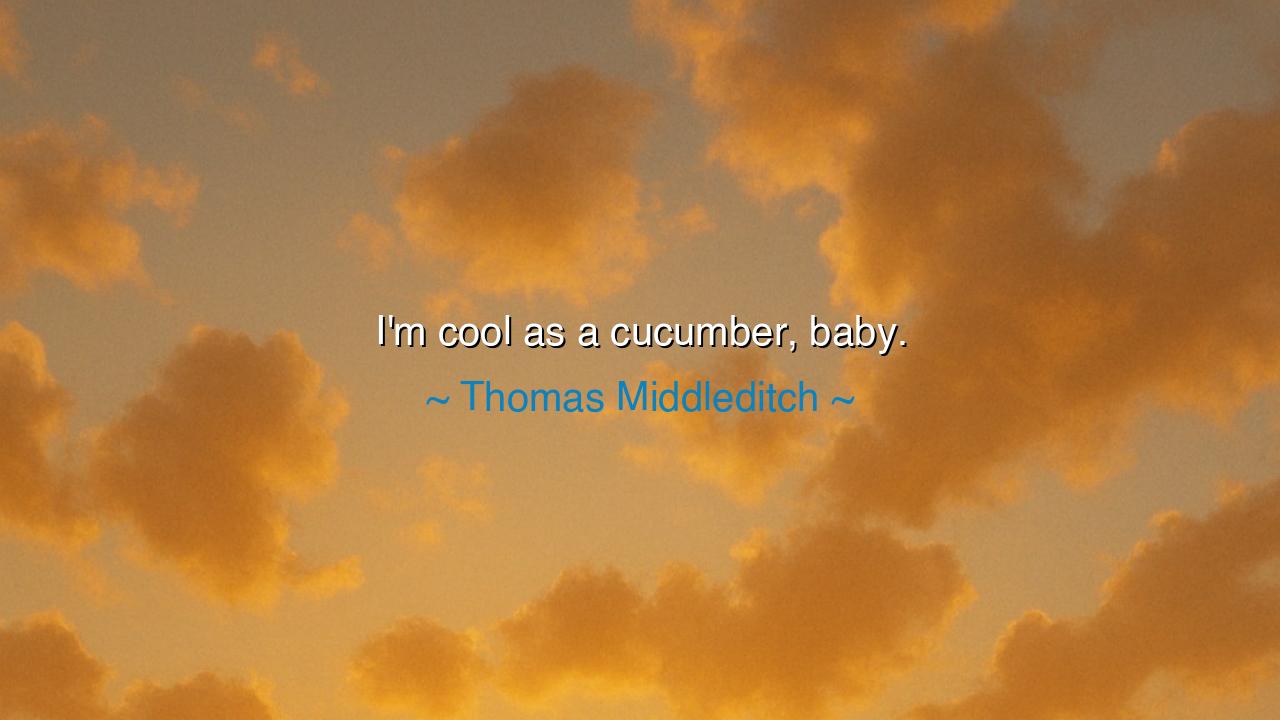
I'm cool as a cucumber, baby.






"I'm cool as a cucumber, baby." – Thomas Middleditch.
In these playful words, Thomas Middleditch speaks with a sense of calm, confidence, and an effortless ease that has long been admired as an ideal state of being. To say one is “cool as a cucumber” is to express an inner tranquility, an ability to stay composed and unaffected by the chaotic forces around us. Middleditch’s expression speaks to a profound truth that has been valued throughout history: the strength of the mind and spirit to remain serene in the face of adversity, to maintain balance and poise, regardless of the circumstances. It is an invitation to embrace calmness, not as a passive state, but as an active choice in how we engage with the world.
The ancient philosophers, particularly the Stoics, celebrated the virtues of calm and self-control. Marcus Aurelius, the Stoic emperor, wrote extensively about the importance of maintaining one’s equanimity, especially in times of great stress or turmoil. For the Stoics, true power was not in reacting impulsively to external events but in cultivating an inner fortress—one that could withstand the most difficult challenges with grace and calmness. Aurelius taught that a person’s ability to control their responses to life’s difficulties was the key to true freedom and peace. Middleditch’s statement resonates with this ancient wisdom, suggesting that maintaining composure in the face of external pressures is not only admirable, but also essential to living a balanced and fulfilled life.
Consider the story of Socrates, who was famously unshaken by the charges against him that led to his trial and eventual execution. Despite the enormous pressures of the moment, Socrates remained steadfast, defending his beliefs with unwavering calm. Even in the face of death, he showed the world the power of a mind at peace. His ability to stay true to his principles and remain composed—even when surrounded by those who sought to silence him—reveals the strength that comes from inner peace and confidence. His example teaches us that calmness in times of crisis is not a passive trait but a demonstration of deep strength and resolve.
In more recent history, we can look to Mahatma Gandhi, whose approach to resistance was rooted in nonviolence and peaceful protest. Gandhi famously said, "In a gentle way, you can shake the world." He embodied a calmness that was more than just an outward show—it was an inner peace that allowed him to stand firm in his convictions while facing immense challenges. His ability to maintain composure in the face of violence and oppression shows that true strength is not in aggression or force, but in the ability to remain centered and composed, no matter what external chaos may arise.
The story of Nelson Mandela also exemplifies the strength that comes from maintaining calmness in the most difficult of circumstances. After spending 27 years in prison, Mandela emerged not with bitterness, but with a peaceful resolve to unite his divided country. His ability to remain cool under pressure, to maintain a sense of inner peace despite the years of suffering, was a crucial element in his leadership. His calmness in the face of adversity inspired millions and proved that inner strength—often associated with being "cool as a cucumber"—is an essential quality of leadership.
The lesson we can take from Middleditch’s lighthearted expression is profound. To be cool as a cucumber is not just a metaphor for remaining calm in stressful situations, but a reminder to cultivate inner peace in all aspects of life. Calmness and composure are not signs of weakness, but of strength—strength rooted in the ability to respond with grace rather than react in haste. By embracing this calm demeanor, we not only improve our own mental and emotional well-being, but we also serve as beacons of stability for others in times of need.
In our own lives, we must strive to adopt the practice of remaining calm in moments of stress. Whether in our personal relationships, careers, or in times of uncertainty, we should seek to find that stillness within ourselves. As the Stoics and other great leaders have shown, it is through self-mastery and the ability to stay centered that we truly navigate the challenges of life with strength and wisdom. So, let us take Middleditch’s words to heart: in the face of turmoil or pressure, we too can choose to be cool as a cucumber, embodying the peace and calmness that comes from knowing who we are and remaining grounded in that understanding. Through this inner peace, we can not only endure, but thrive.






AAdministratorAdministrator
Welcome, honored guests. Please leave a comment, we will respond soon